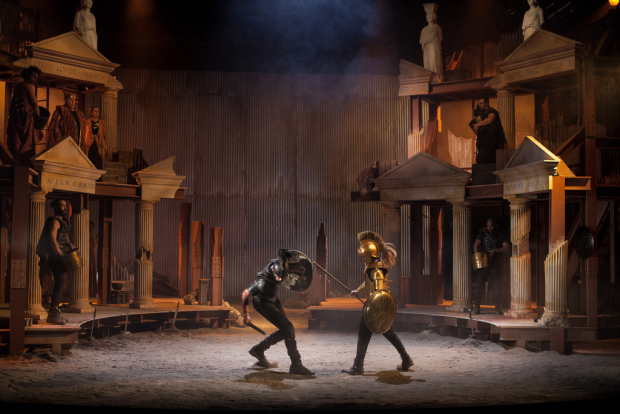The Iliad (Royal Lyceum Theatre, Edinburgh)
Mark Thomson’s final show as artistic director is a version of Homer’s ancient epic poem

© Drew Farrell
And so it’s goodbye to Mark Thomson. After thirteen seasons at the helm of the Lyceum he chooses for his final production what is, in many ways, the very beginning. It’s an effective stroke to bow out with The Iliad because in it he finds the contemporary and the eternal that makes us keep coming back to the ancient myths.
There’s an element of that even in the opening tableau before the action begins. Karen Tennent’s set of broken Greek buildings – are they ruined or merely unfinished? – is peopled with what looks like a crew of poverty stricken down-and-outs, huddled together for shelter, who bear more than a passing resemblance to the images of migrants who have been washed up on the shores of our contemporary Mediterranean. As the lights fade they cast off their modern dress to reveal classical armour, dissolving from the real into the mythical before our eyes.
The show’s greatest asset is Chris Hannan’s script, which is inevitably reliant on telling rather than showing in places, but which largely presents the story streamlined to its most essential core. In his Homer it’s the humans that have the grandeur, struggling with awesome decisions of life, death, hatred and forgiveness, while the gods have the small-minded pettiness, swanning about with their champagne glasses and shades like the super-rich on holiday. That’s mirrored in the language, beautifully adapted and with a lovely sense of poetic flow; yet it’s the humans that get all the magisterial lines about war and peace while the gods tend to squabble and snap at one another. Not everything works: calling Aphrodite the Psycho-bitch is jarring, as is Hera’s reference to a couple having "f**ked each other senseless" (said twice in case you didn’t get it the first time), but Agamemnon’s scenes with Achilles are full of grandeur, and the scenes of grief for Patroclus and Hector are movingly powerful. The sense of scale is also helped by the show’s ritualistic elements, such as the musical chanting that separates each scene and the liberal administration of blood in the battle scenes which maintains a sense of grimy humanity in the midst of the divine bickering.
The cast is very strong, most of the actors playing several parts, and it pivots around on the one hand a sensual, brittle, endlessly contradictory Hera from Emmanuella Cole, and on the other the enormously charismatic Achilles of Ben Turner, enunciating every line with thrilling immediacy. Richard Conlon hams it up beautifully as Zeus, and Ron Donachie cuts a magisterial figure as both Agamemnon and Priam. The testosterone factor is kept high by the bulky Patroclus of Mark Holgate and Benjamin Dilloway’s craggy Hector, but that’s more than balanced out by Amiera Darwish who leavens the texture as an ultra-feminine Briseis, Helen and Aphrodite.
David Greig, one of Scotland’s foremost contemporary playwrights, assumes the mantle of the Lyceum’s Artistic Director next season. He will announce his plans on Tuesday 3rd May. Thomson’s recent Lyceum shows have left powerful memories, this one taking its place alongside hits like Waiting for Godot and his brilliant Caucasian Chalk Circle. He leaves big shoes to fill, but Greig is one of the few who just might be up to the job.
The Iliad runs at the Royal Lyceum Theatre, Edinburgh until 14 May.












